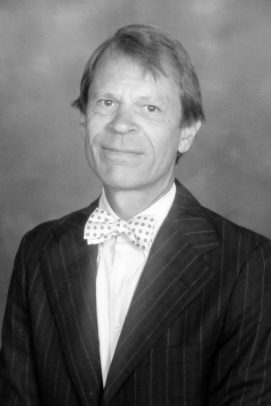UIC receives $1M bequest from beloved art history professor
For more than 30 years, students attending Ross Edman’s art history classes at the University of Illinois at Chicago could expect to see him in his signature bow ties, share a laugh at his witty repartee and learn from his expertise in art.
While Edman died in 2017, the beloved teacher made sure that future generations will continue to have the opportunities to share his artistic love and benefit from his role as a mentor by bequeathing nearly $1 million to establish a merit-based award for graduate-level art history students.
The award comes from the estate of Edman, who died at 80, and of his longtime partner, Jon Waltz, who preceded him in death in 2004. The two also left a nearly $1 million bequest to the Northwestern Pritzker School of Law, where Waltz also spent three decades as a law school professor.
The UIC award will allow the department of art history to recruit the brightest and most qualified applicants to the program, said Martha Pollak, professor and chair of the department of art history.
“The fact that we can offer a named fellowship to a graduate student will raise the visibility of the program,” Pollak said. “It means that the future of the graduate program is on even better footing.”
Edman, who was known for his expertise in Asian art, joined UIC in 1965 while the campus was still located at Navy Pier, and taught until 1995. He also served as an Honors College fellow and became an emeritus faculty member after his retirement.
Edman, whose father worked in the U.S. Department of State, spent long periods of time in Europe, where he developed his love of art. He attended Harvard University and earned his master’s degree in art history from Oberlin College.
In addition to all of the classes he taught over the years, he was the first professor to offer classes on Asian art. His dedication to his students earned him the Silver Circle Award for Excellence in Teaching. He would bring his beloved pair of Pekinese dogs to campus, offering welcome cheer to students and faculty, according to his former colleagues.
While living in Chicago with his partner, Edman became a noted appraiser of art and antiques. He and Waltz later retired to their weekend home in Holland, Michigan, where he loved to garden, cook, read and write long letters to friends.
“His bequest to the department of art history is only the last expression of his generosity and engagement with our students,” said Pollak.
The first recipient of the award was Leslie Wooden, who began working this fall on her doctorate in art history with a concentration in gender and women’s studies. Wooden, who is from Washington, D.C., has two master’s degrees from New York University and a bachelor’s degree from the University of Colorado in Denver.
The award helped her concentrate on her studies and research as she acclimated to the city. She said what made the award especially valuable to her was when she researched Edman and really understood how special he was to his students and to the university.
“It’s a great honor to receive this award in my first semester at UIC,” Wooden said. “The endowment that Ross Edman and his partner bequeathed is especially significant because UIC is a public institution and this award supports students from all socio-economic backgrounds who like to conduct research but may not have access to outside funding.”
Virginia Miller, an associate professor emerita, who first met Edman in 1977 when she came to UIC as a visiting lecturer, remembers him as a gracious teacher who rewarded good work by his students. Miller, a former chair of the department of art history who retired from the university in 2015, remained in contact with him.
She remembers him as being so dedicated and knowledgeable about Western and Asian art that he would jump in and “teach everything.” In addition, he was very supportive of young faculty, especially women at a time when this support was most needed.
“He really genuinely liked the students and liked being with them,” Miller said. “He was really interested in the students and he was a very good teacher, that’s his main legacy.”


